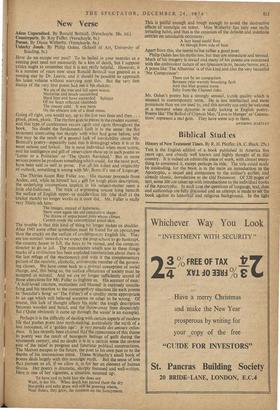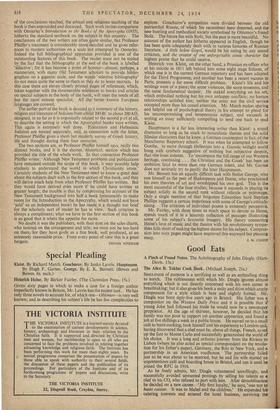History of New Testament Times. By R. H. Pfeiffer. (A.
C. Black. 25s.)
THIS is the English edition of a book published in America five years ago, and already well known and highly thought of in this country. It is indeed an admirable piece of work, with almost every- thing to commend it, except perhaps its title. The title could easily be misleading, for the book is in the main an introduction to the Apocrypha, a sequel and companion to the author's earlier, and already classic, Introduction to the Old Testament. Of 520 pages' of text, some 300 are taken up with introductions to the individual books of the Apocrypha. In each case the questions of language, text, date and authorship are fully discussed and an attempt is made to set the book against its historical and religious background. In the light of the conclusions reached, the ethical and religious teaching of the book is then expounded and discussed. Such work invites comparison with Oesterley's Introduction to the Books of tlw Apocrypha (1935), hitherto the standard textbook on the subject in this country. The conclusions of the two writers are often quite similar, but Professor Pfeiffer's treatment is considerably more detailed and he gives refer- ences to modern authorities on a scale not attempted by Oesterley. Indeed the full bibliographical apparatus provided is one of the outstanding features of this book. The reader must not be misled by the fact that the bibliography at the end of the book is labelled 'Selective.; for it has become a point of honour—almost, perhaps, a mannerism, with many Old Testament scholars to provide biblio- graphies on a gigantic scale, and the words 'selective bibliography' do not mean quite the same to them as they do to lesser mortals. In this case there are eleven closely printed pages of references, which, taken together with the innumerable references to books and articles on special subjects in the body of the book, will meet the needs of all but the most minute specialist. All the better known European languages are covered.
The earlier part of the book is devoted to ,a summary of the history, religion and literature of Judaism from about 200 BC to about 200 AD, designed, in so far as it is organically related to the second part at all, to describe the setting in which the Apocryphal books were written. This again is extremely well done. Palestinian and Hellenistic Judaism are treated separately, and, in connection with the latter, Professor Pfeiffer gives a short but masterly survey of Greek history, life and thought during these four centuries.
The two sections are, as Professor Pfeiffer himself says, really two distinct books, and it is the shorter, historical, section which has provided the title of the whole work. In that connection Professor Pfeiffer writes: 'Although New Testament problems and publications have remained outside the scope of this book, it may possibly help students to understand the world in which Christianity arose.' Certainly students of the New Testament need to know a great deal about the subjects dealt with in the first section of this book, and they will derive much help from what Professor Pfeiffer has written. But they would have derived even more if he could have written at greater length; the trouble is that by compressing his account of the New Testament background into half a book (presumably to make room for the Introduction to the Apocrypha, which would not have 'sold' as an independent book) he has made it a thought too brief for the scholarly sort of reader he has in view. Such criticism is always a compliment; what we have in the first section of this book is so good that it whets the appetite for more. No doubt it was the publishers, with their eyes ,on the sales charts, who insisted on the arrangement and title; we must not be too hard on them, for they have given us a line book, well produced, at an extremely reasonable price. From every point of view this is a great



























 Previous page
Previous page